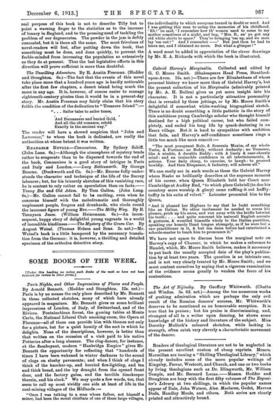Gabriel Harvey's Marginal a. Collected and edited by G. C.
Moore Smith. (Shakespeare Head Press, Stratford- upon-Avon. 16s. net.)—There are few Elizabethans of whose personal history we know more than of Gabriel Harvey's, but the present collection of his Marginalia (admirably printed by Mr. A. H. Bullen) gives us yet more insight into his character. It is not a particularly attractive personality that is revealed by these jottings, or by Mr. Moore Smith's delightful if somewhat white-washing biographical sketch.
There is no doubt something a little pathetic in the story of this ambitious young Cambridge scholar who thought himself destined for a high political career, but who failed com- pletely, and ended his long life by quack-doctoring in an Essex village. But it is hard to sympathize with ambition that fails, and Harvey's self-confidence sometimes rings a little too much like mere conceit :-
"The most praegnant Rule, & Souerain Maxim, of my whole Vertu, & Fortune: no Boddy, withowt Audacity: no Treasure, like A nimble, & durable Boddy : with A liuely & euer-choerly mind : and an inuincible confidence in all interteinements, & actions. Your daily cliarg, to exercise, to lawgh : to proceed bowldly. And then Eloquence, & Industry, will acheue all."
We can easily see in such words as these the Gabriel Harvey whom Nashe so brilliantly describes at the supreme moment of his career, when Queen Elizabeth held her Court near Cambridge at Audley End, "to which place Gabriell (to doe his countrey more worship & glory) came ruffling it out huff ty- tuffty in his suite of velvet." Leicester presented him to the Queen,
"And it pleased her High nes to say that he lookt something like an Italian. No other incitement he needed to rouze hii plumes, prick up his eares, and run away with the bridle betwixt his teeth; . . . and quite renounst his natural' English accents & gestures, & wrestled bimselfe wholy to the Italian puntilios. speaking our homely Iland tongue strangely, as if he were but a raw practitioner in it, & but ten dales before had entertained a schoole-master to teach him to pronounce it."
We have not space to discuss here the marginal note on Harvey's copy of Chaucer, in which he makes a reference to Hamlet, which, Mr. Moore Smith believes, makes it necessary to put back the usually accepted date of the play's publica- tion by at least two years. The question is an intricate one, and is not very clearly treated by Mr. Moore Smith; and we must content ourselves by saying that a rigorous examination of the evidence seems greatly to weaken the force of his contentions.


































































 Previous page
Previous page